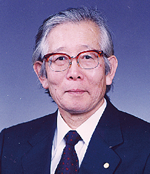Intellectual Environment of the School of Science and Engineering: Nobel Laureates
Tsukuba Science City is a major center of cutting-edge research in science and technology, both within Japan and internationally. It hosts not only the University of Tsukuba, but also more than 50 national research institutes and numerous private sector laboratories, so there is a robust research environment for fields closely related to the School of Science and Engineering. In addition to this spatial environment, the University of Tsukuba’s School of Science and Engineering is supported by a historical environment where two Nobel Laureates have been involved in our educational organization.
SHIRAKAWA Hideki, Professor Emeritus

2000 Nobel Prize in Chemistry
Discovery and development of conductive polymers
Professor Shirakawa devoted himself to research and education for more than 20 years as a faculty member at the University of Tsukuba. He pioneered new areas in polymer chemistry by modifying polyacetylene, an insulating plastic, to be electrically conductive. Through collaborative research with American professors, he elucidated the mechanism of conductive polymers, and received the Nobel Prize in Chemistry in 2000. From 1994 to 1997, he served as Dean of the University of Tsukuba’s Third Cluster of Colleges, the forerunner of today’s School of Science and Engineering. He retired in 2000.
Shirakawa Memorial Room, University of Tsukuba Gallery
TOMONAGA Shin-ichiro, Professor Emeritus, Former President (Tokyo University of Education)

1965 Nobel Prize in Physics
Development of quantum electrodynamics, particularly the super-many-time theory and renormalization theory
Starting in 1941, Professor Tomonaga conducted research at the Tokyo University of Literature and Science, and the Tokyo University of Education—forerunners of the University of Tsukuba. During that time, he developed the super-many-time theory and renormalization theory. In 1965, Professor Tomonaga became the second Japanese person to receive the Nobel Prize, after Hideki Yukawa, and he made major contributions to research in theoretical physics, primarily in the area of elementary particle physics. From 1956 to 1962, he was President of the Tokyo University of Education. He retired in 1969.
Tomonaga Memorial Room, University of Tsukuba Gallery
Tomonaga Memorial Room, University of Tsukuba


 Japanese
Japanese